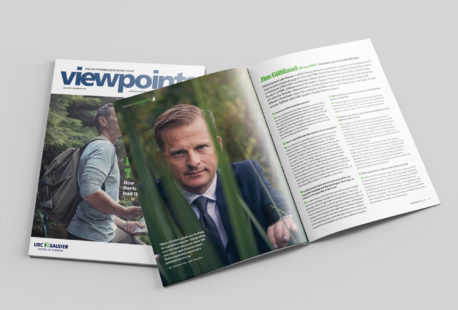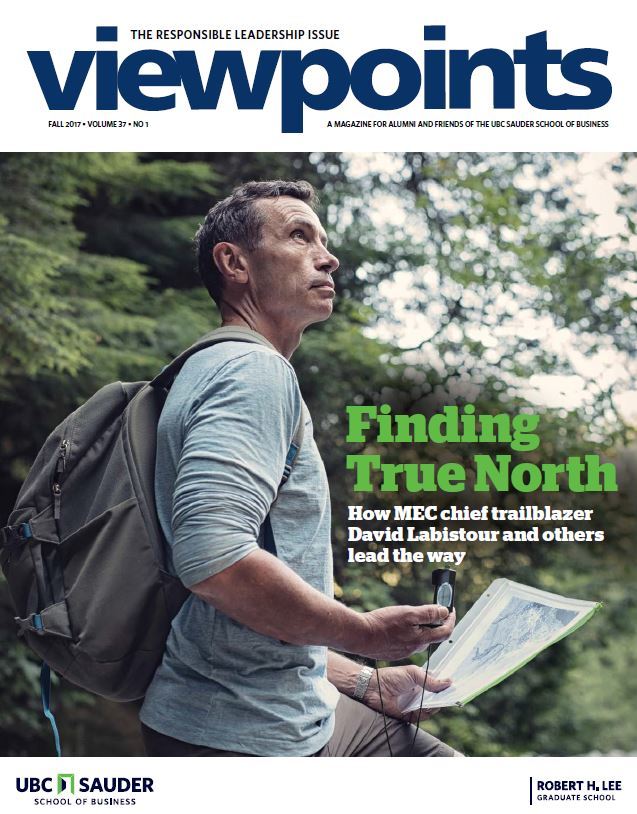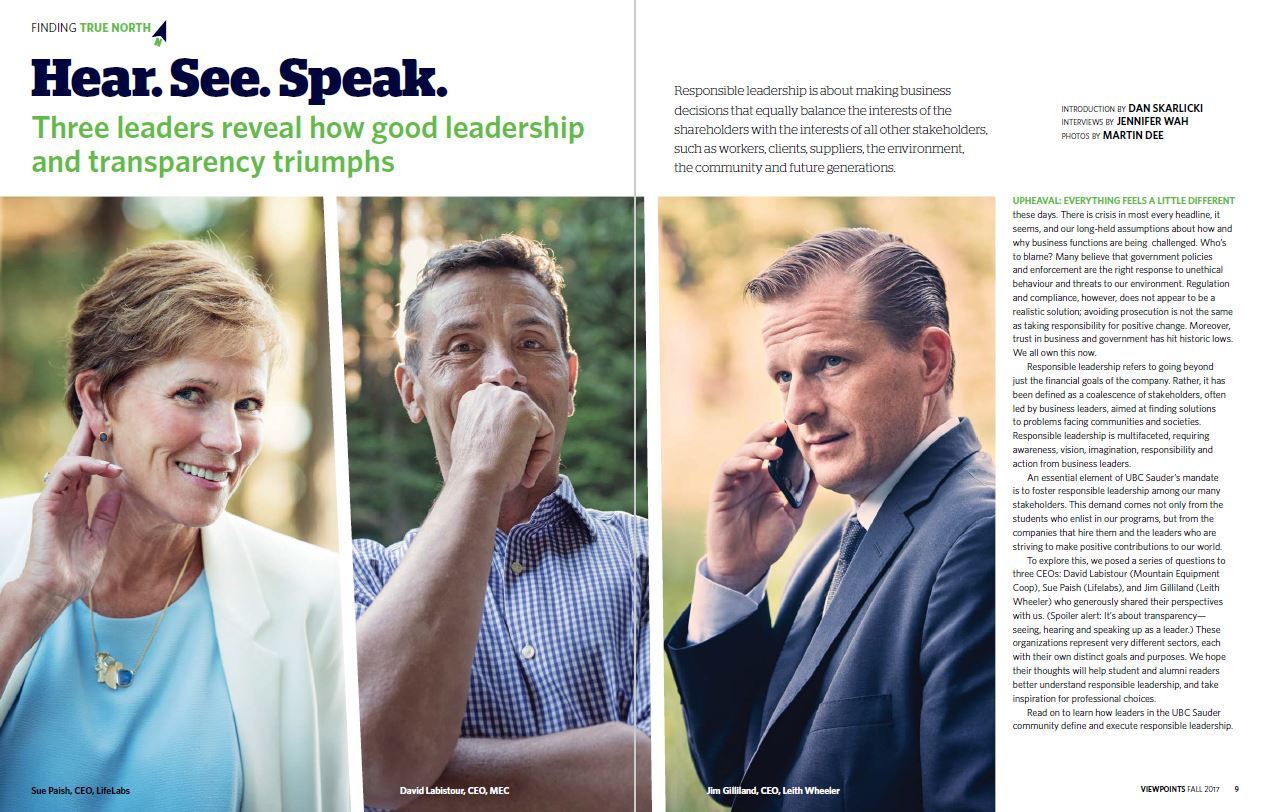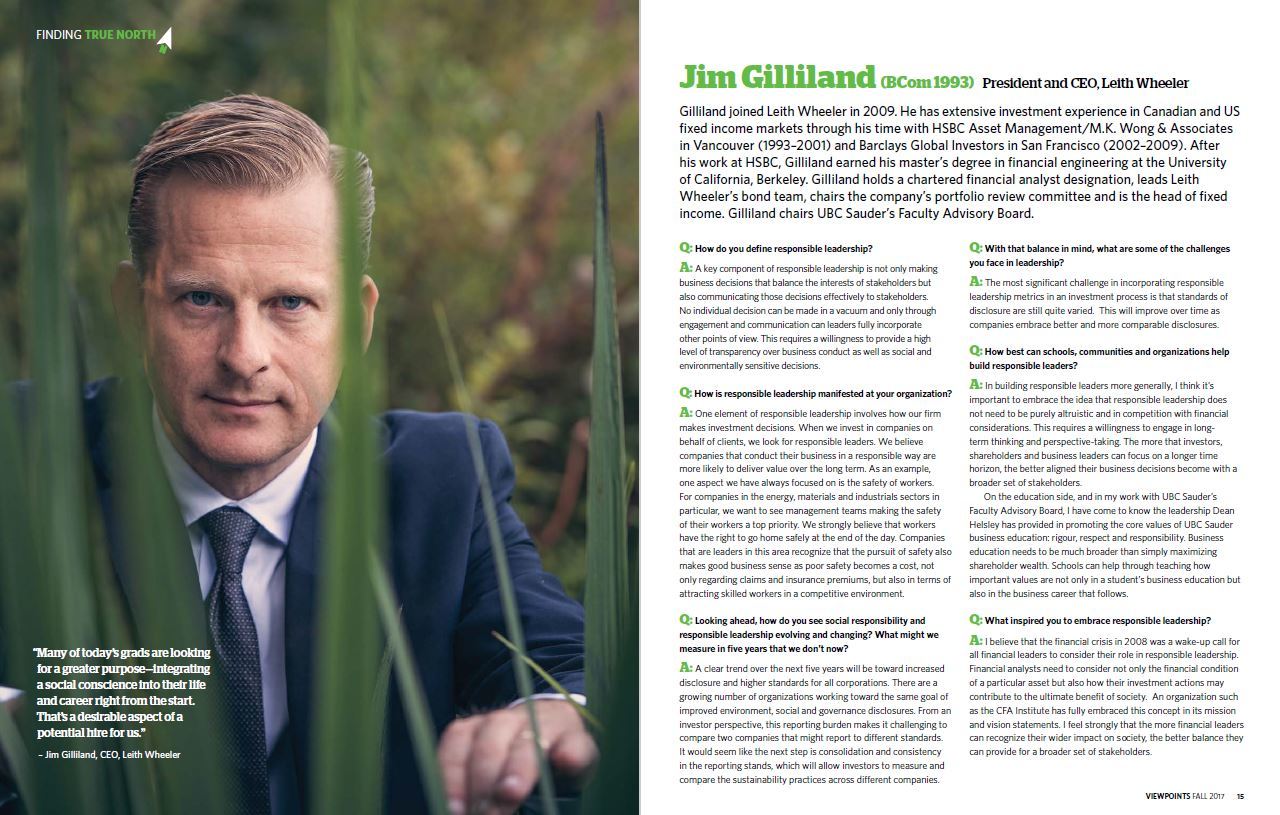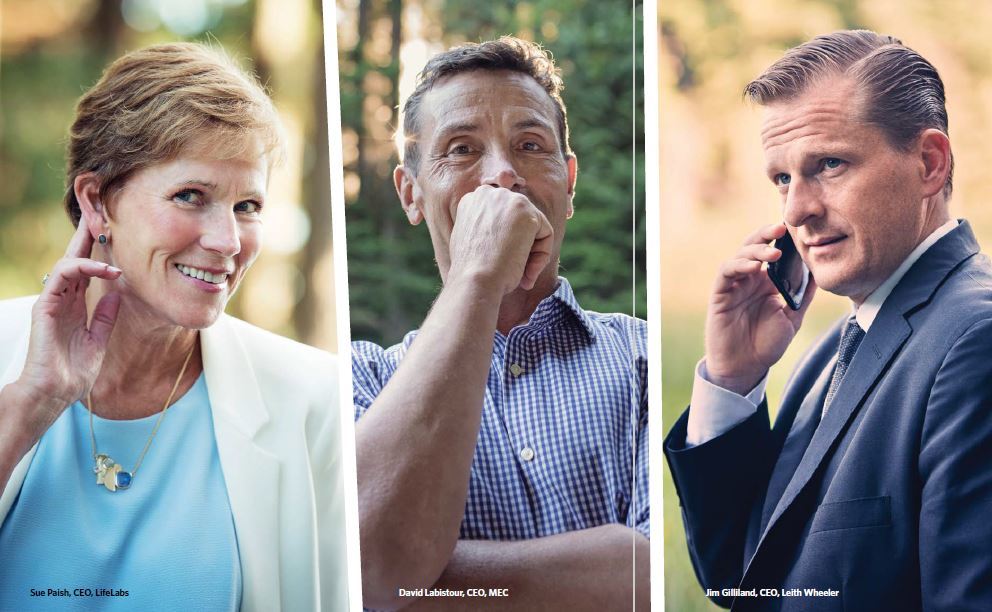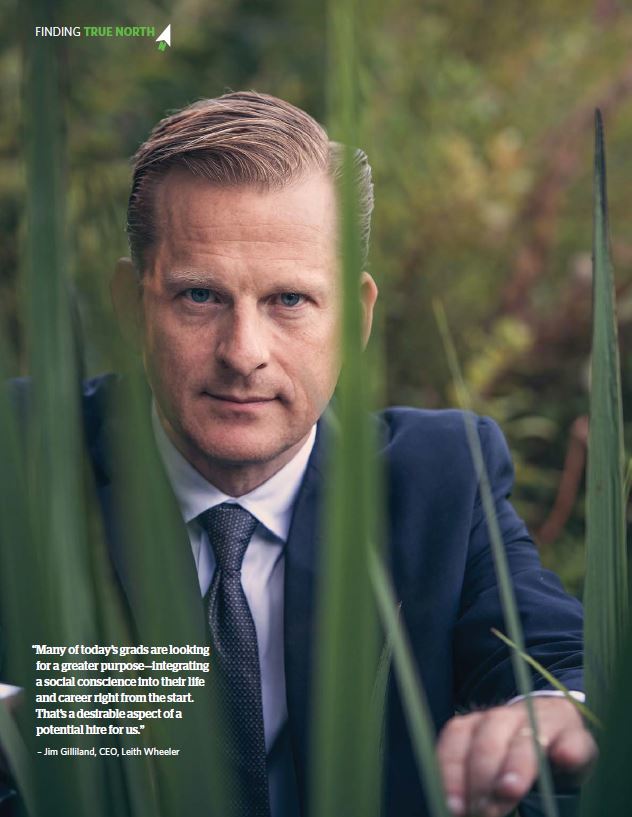November 05, 2018
CEO Jim Gilliland Speaks to UBC Viewpoints
When Jim Gilliland, Leith Wheeler's President, CEO, & Head of Fixed Income, gave an interview to UBC Viewpoints magazine last Fall, he knew something the interviewer did not.
The focus of the issue - and a series of interviews with Sue Paish of LifeLabs, David Labistour of MEC, and Jim - was responsible leadership. As the presses began rolling on that Fall edition, the Leith Wheeler Carbon Constrained Canadian Equity Fund (CCCE) was also coming to life -- and it embodies many of the values Jim and his peers espoused in their profiles. Being forward-thinking. Making responsible investment decisions. Promoting social awareness. Reflecting your values in your business.
The CCCE invests in Canadian stocks that do not earn more than 30 percent of their revenues from fossil fuel industries, including extraction, services, and power. In practice, the Energy stocks that are held in the core Canadian equity portfolio already undergo a thorough review of their environmental, social, and governance (ESG) practices as we have found that with companies with careless clean-up or safety records tend to underperform over time.
"The idea for the Carbon Constrained Canadian Equity Fund came directly from discussions with our clients," Jim said. "So it represented an opportunity for us to actively listen, and respond to what was important to them. In this case, clients wanted an investment vehicle that would allow them to reflect a view on environmental impact through their investments. At the same time, I believe it reflects our own values - providing superior client service and a disciplined investment approach."
For more information on the Leith Wheeler Carbon Constrained Canadian Equity Fund, check out our webpage (series B here, series F here).
And to read the UBC Viewpoints article featuring Jim, we provide few options:
Click the link here and go to pages 11, 15, 16 (source: UBC Sauder Alumni Engagement).
Full article layouts here:
Full text below:
Hear. See. Speak.
FINDING TRUE NORTH
Three leaders reveal how good leadership
and transparency triumphs
introduction by DAN SKARLICKI
interviews by JENNIFER WAH
photos by MARTIN DEE
Responsible leadership is about making business
decisions that equally balance the interests of the
shareholders with the interests of all other stakeholders,
such as workers, clients, suppliers, the environment,
the community and future generations.
UPHEAVAL: EVERYTHING FEELS A LITTLE DIFFERENT
these days. There is crisis in most every headline, it
seems, and our long-held assumptions about how and
why business functions are being challenged. Who’s
to blame? Many believe that government policies
and enforcement are the right response to unethical
behaviour and threats to our environment. Regulation
and compliance, however, does not appear to be a
realistic solution; avoiding prosecution is not the same
as taking responsibility for positive change. Moreover,
trust in business and government has hit historic lows.
We all own this now.
Responsible leadership refers to going beyond
just the financial goals of the company. Rather, it has
been defined as a coalescence of stakeholders, often
led by business leaders, aimed at finding solutions
to problems facing communities and societies.
Responsible leadership is multifaceted, requiring
awareness, vision, imagination, responsibility and
action from business leaders.
An essential element of UBC Sauder’s mandate
is to foster responsible leadership among our many
stakeholders. This demand comes not only from the
students who enlist in our programs, but from the
companies that hire them and the leaders who are
striving to make positive contributions to our world.
To explore this, we posed a series of questions to
three CEOs: David Labistour (Mountain Equipment
Coop), Sue Paish (Lifelabs), and Jim Gilliland (Leith
Wheeler) who generously shared their perspectives
with us. (Spoiler alert: It’s about transparency—
seeing, hearing and speaking up as a leader.) These
organizations represent very different sectors, each
with their own distinct goals and purposes. We hope
their thoughts will help student and alumni readers
better understand responsible leadership, and take
inspiration for professional choices.
Jim Gilliland (BCom 1993) President and CEO, Leith Wheeler
Gilliland joined Leith Wheeler in 2009. He has extensive investment experience in Canadian and US
fixed income markets through his time with HSBC Asset Management/M.K. Wong & Associates
in Vancouver (1993–2001) and Barclays Global Investors in San Francisco (2002–2009). After
his work at HSBC, Gilliland earned his master’s degree in financial engineering at the University
of California, Berkeley. Gilliland holds a chartered financial analyst designation, leads Leith
Wheeler’s bond team, chairs the company’s portfolio review committee and is the head of fixed
income. Gilliland chairs UBC Sauder’s Faculty Advisory Board.
Q: How do you define responsible leadership?
A: A key component of responsible leadership is not only making
business decisions that balance the interests of stakeholders but
also communicating those decisions effectively to stakeholders.
No individual decision can be made in a vacuum and only through
engagement and communication can leaders fully incorporate
other points of view. This requires a willingness to provide a high
level of transparency over business conduct as well as social and
environmentally sensitive decisions.
Q: How is responsible leadership manifested at your organization?
A: One element of responsible leadership involves how our firm
makes investment decisions. When we invest in companies on
behalf of clients, we look for responsible leaders. We believe
companies that conduct their business in a responsible way are
more likely to deliver value over the long term. As an example,
one aspect we have always focused on is the safety of workers.
For companies in the energy, materials and industrials sectors in
particular, we want to see management teams making the safety
of their workers a top priority. We strongly believe that workers
have the right to go home safely at the end of the day. Companies
that are leaders in this area recognize that the pursuit of safety also
makes good business sense as poor safety becomes a cost, not
only regarding claims and insurance premiums, but also in terms of
attracting skilled workers in a competitive environment.
Q: Looking ahead, how do you see social responsibility and
responsible leadership evolving and changing? What might we
measure in five years that we don’t now?
A: A clear trend over the next five years will be toward increased
disclosure and higher standards for all corporations. There are a
growing number of organizations working toward the same goal of
improved environment, social and governance disclosures. From an
investor perspective, this reporting burden makes it challenging to
compare two companies that might report to different standards.
It would seem like the next step is consolidation and consistency
in the reporting stands, which will allow investors to measure and
compare the sustainability practices across different companies.
Q: With that balance in mind, what are some of the challenges
you face in leadership?
A: The most significant challenge in incorporating responsible
leadership metrics in an investment process is that standards of
disclosure are still quite varied. This will improve over time as
companies embrace better and more comparable disclosures.
Q: How best can schools, communities and organizations help
build responsible leaders?
A: In building responsible leaders more generally, I think it’s
important to embrace the idea that responsible leadership does
not need to be purely altruistic and in competition with financial
considerations. This requires a willingness to engage in longterm
thinking and perspective-taking. The more that investors,
shareholders and business leaders can focus on a longer time
horizon, the better aligned their business decisions become with a
broader set of stakeholders.
On the education side, and in my work with UBC Sauder’s
Faculty Advisory Board, I have come to know the leadership Dean
Helsley has provided in promoting the core values of UBC Sauder
business education: rigour, respect and responsibility. Business
education needs to be much broader than simply maximizing
shareholder wealth. Schools can help through teaching how
important values are not only in a student’s business education but
also in the business career that follows.
Q: What inspired you to embrace responsible leadership?
A: I believe that the financial crisis in 2008 was a wake-up call for
all financial leaders to consider their role in responsible leadership.
Financial analysts need to consider not only the financial condition
of a particular asset but also how their investment actions may
contribute to the ultimate benefit of society. An organization such
as the CFA Institute has fully embraced this concept in its mission
and vision statements. I feel strongly that the more financial leaders
can recognize their wider impact on society, the better balance they
can provide for a broader set of stakeholders.
--
By Mike Wallberg, CFA MJ

Recent Posts
- VIDEO: Navigating Dementia: Recognize, Prepare, Plan
- New Trust Reporting Requirements Now in Effect May Catch Some by Surprise
- Leith Wheeler Explainer Series: The Dividend Debate
- Hitting Pay Dirt: The Selling of an Ag Empire
- The Risks of Transactive Memory
- Building Out Your Core with US SMID and Emerging Markets Equities
- Resources for Reconciliation - 2023
- How Could Budget 2023’s Proposed Taxation of Donated Securities Affect Not-for-Profits?
- Taming an Unintentional Portfolio
- Women, Money, and My Holiday Beach Read


